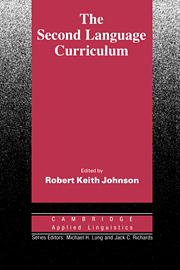Book contents
- Frontmatter
- Contents
- Contributors
- Series editors' preface
- Acknowledgements
- Overview
- I 1 CURRICULUM OVERVIEW
- I 2 CURRICULUM PLANNING
- II ENDS/MEANS SPECIFICATION
- III PROGRAMME IMPLEMENTATION
- IV CLASSROOM IMPLEMENTATION
- Chapter 11 Hidden agendas: the role of the learner in programme implementation
- Chapter 12 The evaluation cycle for language learning tasks
- Chapter 13 Seeing the wood AND the trees: some thoughts on language teaching analysis
- V EVALUATION
- Bibliography
- Index
Chapter 12 - The evaluation cycle for language learning tasks
Published online by Cambridge University Press: 05 October 2012
- Frontmatter
- Contents
- Contributors
- Series editors' preface
- Acknowledgements
- Overview
- I 1 CURRICULUM OVERVIEW
- I 2 CURRICULUM PLANNING
- II ENDS/MEANS SPECIFICATION
- III PROGRAMME IMPLEMENTATION
- IV CLASSROOM IMPLEMENTATION
- Chapter 11 Hidden agendas: the role of the learner in programme implementation
- Chapter 12 The evaluation cycle for language learning tasks
- Chapter 13 Seeing the wood AND the trees: some thoughts on language teaching analysis
- V EVALUATION
- Bibliography
- Index
Summary
Introduction
This paper is concerned with a central issue in language teaching and learning: the efficacy of workplans which are designed to enable the development of an individual's knowledge and capabilities in a new language. Its purpose is to examine both the criteria and the means for the evaluation of language learning tasks. In the paper, I wish to offer particular answers to two major questions. First, what decisions have to be made in evaluating learning tasks and what problems do we have to take account of in the decisions we make? The first part of the paper therefore considers alternatives in the timing, focus, and criteria of task evaluation and the problems which confront us within each of these matters. The second relates to how we might undertake evaluation: what practical procedure might best cope with the problems inherent in the evaluation of learning tasks while also being the most valid means for evaluation currently available to us. My priority throughout the paper is to try to deduce practical proposals, therefore – in addressing this latter question – the second half of the paper suggests ways of implementing a task evaluation cycle.
A language learning task can be regarded as a springboard for learning work. In a broad sense, it is a structured plan for the provision of opportunities for the refinement of knowledge and capabilities entailed in a new language and its use during communication.
- Type
- Chapter
- Information
- The Second Language Curriculum , pp. 187 - 206Publisher: Cambridge University PressPrint publication year: 1989
- 96
- Cited by



